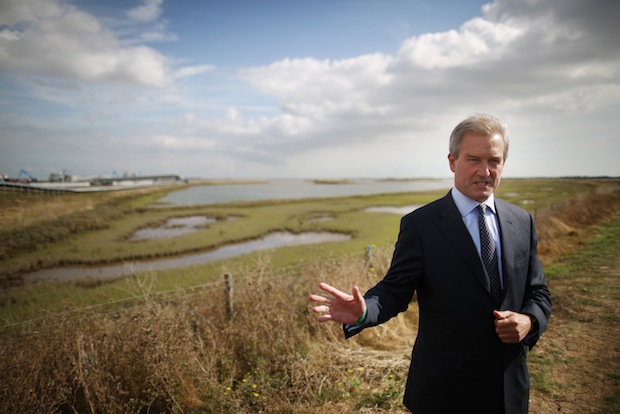Why did David Cameron send Owen Paterson to Environment if he meant to sack him? Paterson knew and cared about his subject. He wore green wellies with panache, loathed Europe and wind turbines, and argued with everyone. He was a sop to the shires and a bulwark against Ukip. Yet like his colleague Michael Gove, he was found to be ‘toxic’. He has told the Sunday Telegraph that he blames his downfall on the ‘green blob’, on ‘highly paid, globe-trotting, anti-capitalist agitprop’.
Paterson had discovered that the toughest job in government nowadays is no longer foreign affairs or defence, awash in grand crises, whirling dervishes and expensive kit. A Middle East peace treaty is a doddle compared with bovine TB, flood defences, wind turbines, EU grants and renewables subsidies. Paterson found the ferocity of some green lobbyists akin to those in animal rights, purple with rage and immune to reason, humour or courtesy. They are the Ranters, Shakers and Diggers of our age, treating disagreement as a matter not of debate but of extermination.

I chair a substantial component of Paterson’s blob, the National Trust, and can see where he is coming from. Many supposedly ‘charitable’ groups are nothing of the sort. They are affinity sects with blatantly political programmes, justifying every campaigning excess as ‘saving the planet’. Some are fronts for the smartest money around, wind turbine subsidy, which as Paterson claims, spends vast sums of public cash ‘rewarding rich landowners, with undetectable effects on carbon dioxide emissions’. At a recent meeting in Lincolnshire, I was richly heckled on the glories of wind power by the Prime Minister’s father-in-law, no less. I followed Deep Throat’s admirable advice, ‘Always follow the money.’
The truth is there are many green blobs. The National Trust was set up for the ‘permanent preservation for the benefit of the nation of lands and tenements of beauty or historic interest’. Since the days of Octavia Hill it has campaigned to that end. It is no self-appointed, let alone globe-trotting, lobby. It is four million members who are unlikely to agree on anything beyond a car park and a cup of tea. On badgers, foxes, turbines, fracking, high-speed rail or third runways, the trust embraces every view under the sun. On politics it is a many-headed hydra, not a blob.

As a result it is not easy to steer any campaign through the turbulent waters of the environment. The trust is not in the business of energy policy, farm policy, housing policy or transport policy. Yet it is sucked into all by the sheer range of its interests. In the case of climate change, it seeks to reduce the reliance of its estate on carbon energy, and it tests any proposal for any development of structure against its mission to guard the beauty of the landscape and coastline. Hence its opposition to relevant wind proposals still flooding through the government machine, despite Paterson’s opposition.
In 2011 the trust found itself ranged against the coalition’s draft planning policy, blatantly drafted by construction industry lobbyists with a direct line to the Tory party and Treasury. Rural communities were ordered by Eric Pickles and his junior, Nick Boles, to accept ‘volume housing estates’ wherever profit beckoned, irrespective of local views, green belt or landscape guardianship. The weasel word ‘sustainable’ turned out to mean profitable. The trust was inundated with pleas for help and succeeded in having the draft marginally diluted. We were pushing ‘non-political’ activity to the limit, but the overwhelming reaction of our members was that we should have been even more outspoken, as on turbines.

When politicians complain that people no longer crave participation I say rubbish. They crave it in new ways. There is now real public concern over the state of the environment, whether global, rural or ‘in my back yard’. While Paterson may be right that some wilder ‘planet savers’ are hypocrites, most care desperately about their surroundings. They know, because they can see, their countryside is more menaced by this government’s ‘let rip’ planning reform than at any time since the town and country planning of the 1940s.
To drive with one’s eyes open across England these days is to see how far those charged with defending its visual integrity have failed. Where once there was a clear divide of town from country, urban from rural, unique in most of Europe, there is now emerging an unplanned sprawl of warehouses, toy-town estates, pylons, turbines and advertisements in fields. The visual character of the English landscape is starting to resemble Ireland, Spain or Portugal.
Paterson may claim to have been really fighting with the conservationists. We never saw him at the front. Like Blairites who ‘secretly disowned’ the Iraq war, he must take collective responsibility. He did good work on fisheries. He messed up the badger cull, and came late to upland re-wilding. But his clear affection for the countryside never gained traction in the lobbyists’ paradise that is the court of King Cameron.
It was said after the Greens first surged to prominence in the 1989 European elections that Thatcher offered ‘to drain some of their wetlands for them’. Paterson has been sacrificed on a similarly crass altar. It is unfair, but he should blame the boss, not the blob.
Simon Jenkins, is chairman of the National Trust. He writes a column for the Guardian, and is a former editor of the Times and the London Evening Standard.






Comments